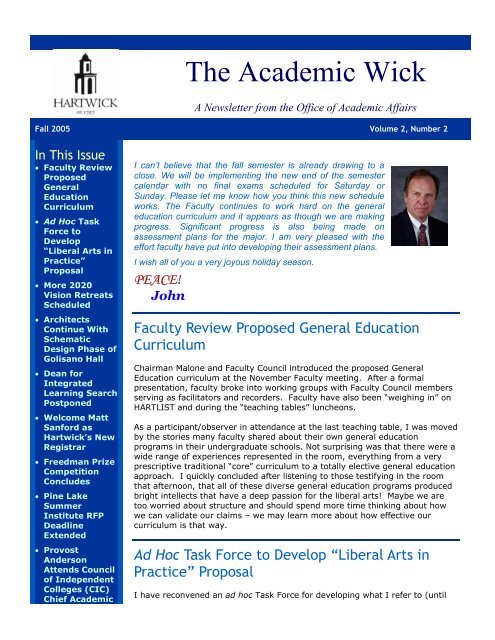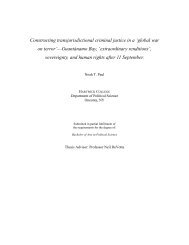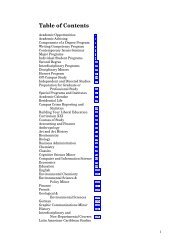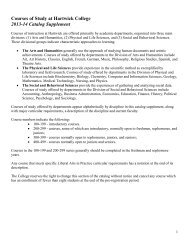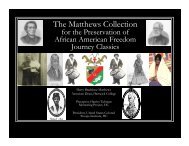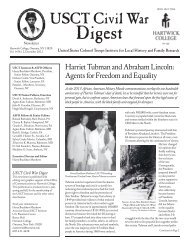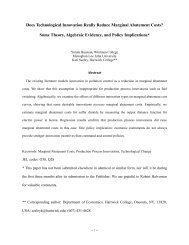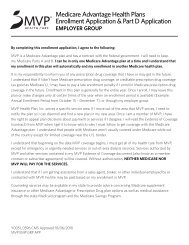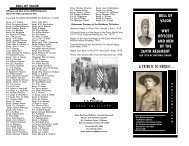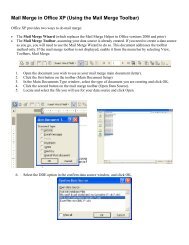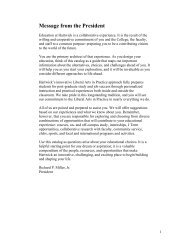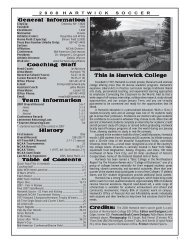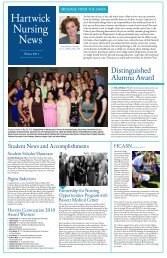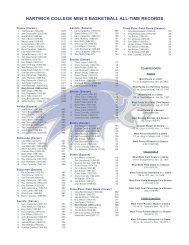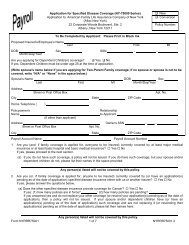The Academic Wick - Hartwick College
The Academic Wick - Hartwick College
The Academic Wick - Hartwick College
You also want an ePaper? Increase the reach of your titles
YUMPU automatically turns print PDFs into web optimized ePapers that Google loves.
<strong>The</strong> <strong>Academic</strong> <strong>Wick</strong><br />
A Newsletter from the Office of <strong>Academic</strong> Affairs<br />
Fall 2005 Volume 2, Number 2<br />
In This Issue<br />
• Faculty Review<br />
Proposed<br />
General<br />
Education<br />
Curriculum<br />
• Ad Hoc Task<br />
Force to<br />
Develop<br />
“Liberal Arts in<br />
Practice”<br />
Proposal<br />
• More 2020<br />
Vision Retreats<br />
Scheduled<br />
• Architects<br />
Continue With<br />
Schematic<br />
Design Phase of<br />
Golisano Hall<br />
• Dean for<br />
Integrated<br />
Learning Search<br />
Postponed<br />
• Welcome Matt<br />
Sanford as<br />
<strong>Hartwick</strong>’s New<br />
Registrar<br />
• Freedman Prize<br />
Competition<br />
Concludes<br />
• Pine Lake<br />
Summer<br />
Institute RFP<br />
Deadline<br />
Extended<br />
• Provost<br />
Anderson<br />
Attends Council<br />
of Independent<br />
<strong>College</strong>s (CIC)<br />
Chief <strong>Academic</strong><br />
I can’t believe that the fall semester is already drawing to a<br />
close. We will be implementing the new end of the semester<br />
calendar with no final exams scheduled for Saturday or<br />
Sunday. Please let me know how you think this new schedule<br />
works. <strong>The</strong> Faculty continues to work hard on the general<br />
education curriculum and it appears as though we are making<br />
progress. Significant progress is also being made on<br />
assessment plans for the major. I am very pleased with the<br />
effort faculty have put into developing their assessment plans.<br />
I wish all of you a very joyous holiday season.<br />
PEACE!<br />
John<br />
Faculty Review Proposed General Education<br />
Curriculum<br />
Chairman Malone and Faculty Council introduced the proposed General<br />
Education curriculum at the November Faculty meeting. After a formal<br />
presentation, faculty broke into working groups with Faculty Council members<br />
serving as facilitators and recorders. Faculty have also been “weighing in” on<br />
HARTLIST and during the “teaching tables” luncheons.<br />
As a participant/observer in attendance at the last teaching table, I was moved<br />
by the stories many faculty shared about their own general education<br />
programs in their undergraduate schools. Not surprising was that there were a<br />
wide range of experiences represented in the room, everything from a very<br />
prescriptive traditional “core” curriculum to a totally elective general education<br />
approach. I quickly concluded after listening to those testifying in the room<br />
that afternoon, that all of these diverse general education programs produced<br />
bright intellects that have a deep passion for the liberal arts! Maybe we are<br />
too worried about structure and should spend more time thinking about how<br />
we can validate our claims – we may learn more about how effective our<br />
curriculum is that way.<br />
Ad Hoc Task Force to Develop “Liberal Arts in<br />
Practice” Proposal<br />
I have reconvened an ad hoc Task Force for developing what I refer to (until
Officer<br />
Conference<br />
• Ad Hoc Task<br />
Force Formed to<br />
Discuss<br />
Disaster<br />
Planning<br />
• VP Wood<br />
Explains New<br />
Budget Reports<br />
to Department<br />
Chairs and<br />
Dean’s Council<br />
• Education<br />
Commissioner,<br />
Richard Mills, is<br />
the Les Rude<br />
Lecturer for this<br />
Year<br />
PLUS!<br />
*ASSESSMENT<br />
TIPS<br />
*PHOTO GALLERY<br />
Faculty<br />
Development<br />
• <strong>The</strong> 2005-06<br />
Faculty Lecture<br />
Series:<br />
December 2, 2005<br />
Laurel Elder<br />
February 17, 2006<br />
Scott Dalrymple<br />
March 3, 2006<br />
Susan Navarette<br />
April 7, 2006<br />
Jason Antrosio<br />
May 5, 2006 Rich<br />
Brown<br />
we can come up with a better name) a “Liberal Arts in Practice” program. <strong>The</strong><br />
goal is rather straightforward. I would like to be able to guarantee that<br />
every student will have, as part of their <strong>Hartwick</strong> <strong>College</strong> experience,<br />
an opportunity to participate in an off-campus J-term program or paid<br />
internship.<br />
This would be available to all students as part of their tuition. Students, who<br />
couldn’t afford the cost for an off-campus J-term or not be able to do an<br />
internship because they couldn’t afford living costs, will be able to have at least<br />
one of these experiences made available to them. I think this would be an<br />
excellent achievement. <strong>The</strong> proposed program would be supportive of our<br />
educational mission and philosophy. In addition, I believe it would add a very<br />
marketable and distinctive element to our educational program. Currently, the<br />
members of the Task Force include: Bill Wood, Greg Krikorian, Patricia Maben,<br />
Ellen Falduto, Shannon Forbes, Mary Krikorian, Nadine Carvin, Larry Malone,<br />
and me as convener. As this idea matures, we intend to have various<br />
constituencies respond to the idea before we bring it to the Board of Trustees.<br />
To date, we have run the numbers through a “rough” business model and have<br />
deemed it worthy of further attention. We have also roughed out some policy<br />
issues as well. Our next step is to sharpen the pencil and put something down<br />
on paper.<br />
More 2020 Vision Retreats Scheduled<br />
By the end of the academic year, we hope to have conducted three additional<br />
2020 Vision Retreats with students, alumni, and Board of trustee members.<br />
<strong>The</strong> retreats will be conducted in the same way as were the ones with faculty<br />
and Dean’s Council. <strong>The</strong>re will be a required reading of four articles about the<br />
future of higher education and in particular, liberal arts colleges. We will<br />
collect comments in a follow-up report that will be combined with the current<br />
retreat reports and used in consideration for our next strategic planning phase.<br />
Architects Continue With Schematic Design Phase<br />
of Golisano Hall<br />
Representatives from Burt, Hill,<br />
Kosar, and Rittelmann were in town<br />
this past November to refine<br />
schematic designs for Golisano Hall.<br />
<strong>The</strong>y spent one day meeting with the<br />
scheduled building occupants by floor.<br />
Once again, I observed some excellent<br />
give and take between the architects<br />
and faculty and staff as we worked<br />
toward a final floor plan. Any day we<br />
should see the revised floor plans on<br />
the designated website. Please contact
Office of <strong>Academic</strong><br />
Affairs<br />
John M. Anderson<br />
Executive Vice<br />
President and<br />
Provost<br />
Gerry Hunsberger<br />
Dean of <strong>Academic</strong><br />
Affairs<br />
Donna Avery<br />
Director of the Office<br />
of <strong>Academic</strong> Affairs<br />
Carla Tenace<br />
Assistant to the<br />
Dean<br />
Kay Amatucci<br />
Part-time secretary<br />
Joan Place<br />
Part-time secretary<br />
me if you still don’t have access to the website or if you have any concerns<br />
about the revised plans.<br />
Dean for Integrated Learning Search Postponed<br />
President Miller and I both concluded that it would be in the <strong>College</strong>’s best<br />
interest if we suspended the search for the Dean for Integrated Learning for<br />
one year. This decision was made after the October Board meeting when it<br />
was determined we were not going to be able to fund the additional 1.5%<br />
salary increase for this year. Our priority goal was to assure funding for the<br />
faculty searches currently underway. We view the Dean for Integrated<br />
Learning position key to the future of integrating much of our experiential<br />
programs but decided to wait a year before implementing this strategy so we<br />
can maintain the progress mapped out in the financial equilibrium plan. Our<br />
intent is to begin the Dean search by fall 2006.<br />
Welcome Matt Sanford as <strong>Hartwick</strong>’s New<br />
Registrar<br />
Matt Sanford officially joined the <strong>Hartwick</strong> <strong>College</strong> community November 7,<br />
2005. Matt holds a BA in English and General Literature from Binghamton<br />
University, and his employment background includes work as a technical editor<br />
and writer, web applications developer and information processing specialist.<br />
Prior to coming to <strong>Hartwick</strong>, Matt served as data manager for student records<br />
at the <strong>College</strong> of Human Ecology at Cornell University. <strong>The</strong>re he worked very<br />
closely with the registrar’s office and was responsible for gathering and<br />
reporting information to various constituencies at the college. Matt resides in<br />
New Berlin with his wife, Julia. Welcome aboard Matt!<br />
Freedman Prize Competition Concludes<br />
It’s that time of year. Once again, thanks to the generosity of Allen and Judy<br />
Freedman, we were treated to some of <strong>Hartwick</strong>’s most talented young adults<br />
and their original ideas for in-depth study within their discipline this November.<br />
For years Allen and Judy have not only funded this research competition, they<br />
have played an active role in assessing the best that <strong>Hartwick</strong> has to offer.<br />
<strong>The</strong> following students competed for the coveted Freedman prizes:<br />
Jason Stone [advisor: Neil DeVotta, political science] - Degeneration,<br />
Devolution, and the Dhammadipa: <strong>The</strong> Effects of Sinhalese-<br />
Buddhist Fundamentalism on the Sri Lankan Peace Process<br />
Junior G. Garraway [advisor: Thomas Licata, music] - A stylistic Solo Piano<br />
Recital and Lecture: Beethoven, Bach/Busoni and Liszt<br />
Stephanie Carr [advisors: Eric Johnson, geology & Paul House, chemistry] –<br />
Development and Calibration of an Amphibole-Scapolite<br />
Geothermometer<br />
Laura Clough [advisor: Karl Seeley, economics] - Small Electrical Grid<br />
Simulation of Multiple Renewable Dispersed Generation<br />
Resources<br />
Ryan Quarles [advisor: Stanley Sessions, biology] - Microdissection and<br />
Molecular Evolution of the Y Chromosome in the Salamander,
Necturus maculosus<br />
Stefanie Coforio [advisor: Ron Brzenk, mathematics] - Analysis of Epidermal<br />
Nerve Endings: Applying Math to Uncover Patterns and<br />
Statistical Significance<br />
Jessica Valluzzi [advisor: KinHo Chan, psychology] - Effects of Fluoxetine on<br />
Learning and Cognitive Abilities<br />
Lindsay Yorns [advisor: Laura Malloy, biology] - <strong>The</strong> Role of Histamine H 3<br />
Receptors In Myocardial Function and Infarct Size Following<br />
Cardiac Ischemic Preconditioning<br />
All contestants gave oral presentations of up to twenty minutes, followed by a<br />
session of up to twenty minutes of questions from the judging panel. <strong>The</strong><br />
panel consisted of Dr. Allen & Mrs. Judy Freedman, Susan Navarette (English),<br />
Robert Gann (computer & information science and physics) and William Lister<br />
(education) and was chaired by Gerald Hunsberger, Dean of <strong>Academic</strong> Affairs.<br />
<strong>The</strong> student presenters were<br />
guaranteed an award of at least<br />
$500 as a result of winning at the<br />
divisional level. Saturday’s<br />
winners will receive the following<br />
total prizes (which include the<br />
$500 previously awarded):<br />
Lindsay Yorns -- $4000 / Malloy --<br />
$1000<br />
Ryan Quarles -- $4000 / Sessions<br />
-- $1000<br />
Stefanie Coforio -- $2500 /<br />
Brzenk -- $500<br />
Jessica Valluzzi -- $1500 / Chan --<br />
$500<br />
Stephanie Carr --- $1500 / Johnson & House -- $500<br />
Pine Lake Summer Institute RFP Deadline<br />
Extended<br />
<strong>The</strong> following was a memo I sent faculty in October. Please note that I have<br />
extended the deadline to the end of this semester. If you have any<br />
questions, please don’t hesitate to give me a call.<br />
“<strong>The</strong> intent of this proposal is to establish for-credit and not-for-credit courses<br />
at the Pine Lake Summer Institute for summer 2006. Courses could be<br />
existing courses or new ones, but each should be related in some way to the<br />
advantages of being taught at Pine Lake. Our goal is to develop and deliver at<br />
least one for-credit and one not-for-credit course from each division of the<br />
<strong>College</strong>. Involved faculty would assist the Pine Lake Director in marketing and<br />
promoting the courses. This is a pilot model to be reassessed once a new<br />
Director for Pine Lake assumes office July, 2006.<br />
Course Development for both for-credit and not-for-credit courses:<br />
1. Develop a course syllabus which should include as a minimum, brief<br />
course description learning objectives, course content, course schedule,
eadings, and evaluation methods.<br />
2. If for-credit status is desired, the faculty will have to adhere to Faculty<br />
Council Guidelines regarding summer course credits and seek approval<br />
from Faculty Council in a timely manner if needed such as approval for<br />
curriculum XXI status.<br />
3. Work with the Pine Lake Director, office of admissions, and academic<br />
affairs to identify potential student markets, and specifically with the<br />
Pine Lake Director to coordinate schedules, residence requirements,<br />
promotional materials, access to facilities, and budget preparation (to<br />
include course materials, etc.).<br />
Interested faculty members should submit a brief one page proposal (form<br />
attached) for Pine Lake Summer Institute courses to the Executive Vice<br />
President and Provost no later than October 28, 2005 (NOTE: deadline<br />
extended to December 22,2005). A peer review will be conducted and<br />
faculty notified by November 15, 2005 (NOTE: Changed to January 15,<br />
2006). If approved, faculty will receive $1,000 per credit hour to develop<br />
and teach the course. If the course is designed as not-for-credit,<br />
compensation will be negotiated based on the particular course schedule. If<br />
minimum enrollment is not achieved the faculty will still be compensated at<br />
50%.<br />
Tuition would be based on the summer rate of $220 per credit hour with a<br />
minimum of ten students. Not-for-credit rate would be determined based on<br />
program type (residential, lab, etc.) and length. Courses for credit should be<br />
offered primarily in the month of June and not-for-credit courses July or<br />
August.<br />
Additional costs should be identified in the budget development process and<br />
approved by the Pine Lake Director.”<br />
Provost Anderson Attends Council of Independent<br />
<strong>College</strong> (CIC) Chief <strong>Academic</strong> Officer Conference<br />
I was fortunate to be able to attend my first CIC conference held in San<br />
Antonio, Texas. It was a pleasure to network with 322 of my colleagues at<br />
primarily small private independent colleges. Featured key note speakers<br />
included Richard Chait from Harvard, one of my former Harvard Institute<br />
professors. His talk was titled “When the Next Generation of Faculty Members<br />
Meets the Current Generation of <strong>Academic</strong> Officers.” Dick shared outcomes of<br />
his recent research about the “emergent” generation of faculty and what they<br />
desire in a career. As he puts it, “…the quality of the work place may trump<br />
salary and tenure track needs...” of the “emergent” faculty. It was comforting<br />
to know that at <strong>Hartwick</strong> we are working toward providing what many faculty<br />
are seeking in a professorship such as, joint appointments, new<br />
course/curriculum development opportunities, small and personal learning<br />
environments, and increasing transparent administrative cultures.<br />
Stan Katz’s talk, “Does the Curriculum Really Matter?” was very apropos<br />
considering our current discussions about the general education curriculum.<br />
Stan is an advocate of the liberal arts education as a strong and necessary<br />
foundation for the undergraduate experience, but recognizes that the liberal<br />
arts core has been and will continue to evolve as society does and we need to<br />
continually rethink the curriculum…sound familiar? He supports the notion of<br />
integrated learning as outlined in a recent Peer Review issue.
Ad Hoc Task Force Formed to Discuss Disaster<br />
Planning<br />
Due to a concern raised by Professor Bob Gann, I have formed an ad hoc Task<br />
Force to study the impact a natural disaster would have on the <strong>College</strong> if we<br />
were forced to close for any period of time. This concern was prompted by the<br />
recent tragedies due to Hurricanes Katrina and Rita and their impact on the<br />
many <strong>College</strong>s in that region as well as the potential for a pandemic brought<br />
about possibly by an avian flu. If you have been keeping up with news from<br />
the south, you may have heard of colleges retrenching significant numbers of<br />
their faculty due to closures. I think it is wise to consider how we might avoid<br />
such a situation at <strong>Hartwick</strong>. To date the Task Force members are: Betsey<br />
Ayer, Sharon Dettenrieder, Mark Erickson, Ellen Falduto, Bob Gann, Greg<br />
Krikorian, Larry Malone and Liz Morley.<br />
VP Wood Explains Budget Reports to Department<br />
Chairs and Dean’s Council<br />
Bill Wood and Nancy Lehtonen explained to department chairs and Dean’s<br />
Council representatives how the new budget reporting system works.<br />
Highlights of the conversation also indicate other issues raised. Taken from<br />
the department chairs meeting minutes are the following summaries:<br />
• Bill Wood distributed an example of a report of year-to-date expenses<br />
for departments that included current budget amounts and comparisons<br />
to YTD for last year and last year’s total expenses. <strong>The</strong>se actual reports<br />
will be sent to all budget managers on Friday of this week (November<br />
18). He provided an overview of the report details.<br />
• Budget managers will be able to see current year data on Web Advisor.<br />
If budget managers have not been able to access their accounts on web<br />
advisor, please contact Nancy Lehtonen.<br />
• Restricted gifts to departments may be “budget relieving” if they are<br />
lightly restricted – e.g. gift for “Nursing Department” would not add to<br />
budget. Highly restricted gifts are not budget relieving.<br />
• Institutional Advancement must raise enough unrestricted gifts to cover<br />
college requirements for operating expenses, otherwise funded by net<br />
tuition (~80%) and endowment draw.<br />
• Planning of large operational expenses that are not annual in nature will<br />
be needed. Equipment & service contracts are examples of<br />
expenditures that would fall into this category. A process for budget<br />
managers to indicate those kinds of expenses and their timing to aid in<br />
the long term planning process will be forthcoming.<br />
• A question was raised about the possibility of allowing a department to<br />
roll over unused budget allocations from one fiscal year to the next so<br />
that large expenses could be budgeted for more evenly. With current<br />
auditing requirements, this is very difficult to do.
Education Commissioner, Richard Mills, was the<br />
Les Rude Lecturer for this Year<br />
<strong>Hartwick</strong> <strong>College</strong> and the greater Oneonta<br />
community were treated to a Les Rude<br />
lecture delivered by Richard Mills,<br />
Commissioner of Education and President<br />
of the University of the State of New York.<br />
Commissioner Mills recently returned from<br />
a trip to China where he compared the<br />
educational standards there to those in<br />
New York. He advocated that we have to<br />
continue to raise the quality of our public<br />
system of education in this country. After<br />
the lecture, the Commissioner joined a<br />
number of students and faculty at a<br />
dinner where he engaged <strong>Hartwick</strong><br />
students in often lively debates as he<br />
moved from table to table.<br />
Photo Gallery<br />
Nick Lambros enjoys a moment with Board<br />
members Harold Nelson and Ginny Elwell at<br />
the Yager Museum reception in October.<br />
At right, Susan Young joins George<br />
and Gesella Stephan at the<br />
dedication ceremony for the<br />
Graphics Imaging Laboratory in<br />
Johnstone Science Center last<br />
October.
Your Provost off to work the ticket table at the<br />
Gallery of Ghouls hosted by the Upper Catskill<br />
Community Council for the Arts (UCCCA) last<br />
Halloween. <strong>The</strong>re is something magical that<br />
happens to one’s personality when in costume.<br />
By the way, it was a great event and I encourage<br />
you to bring your family next year!<br />
Program Assessment:<br />
Keep it Simple<br />
As Faculty begin to engage in student learning outcomes assessment at the<br />
programmatic level, I have one bit of advice. If this is the first time your<br />
department is conducting formal assessment, start with learning outcomes that<br />
appear to be the easiest to measure. Decide early on the best way to collect your<br />
samples of student work, decide when you will actually collect the data (work),<br />
who will actually conduct the assessment, and when will be the best time to do<br />
the assessment. A little planning up front will make life a lot easier down the<br />
road.<br />
If you have questions as you progress in your planning, please don’t hesitate to<br />
contact me. I have had a number of faculty come to me with questions already.<br />
John M. Anderson<br />
If you have assessment tips you would like to share with you colleagues, please<br />
forward them to me and I will include them in the next newsletter!


